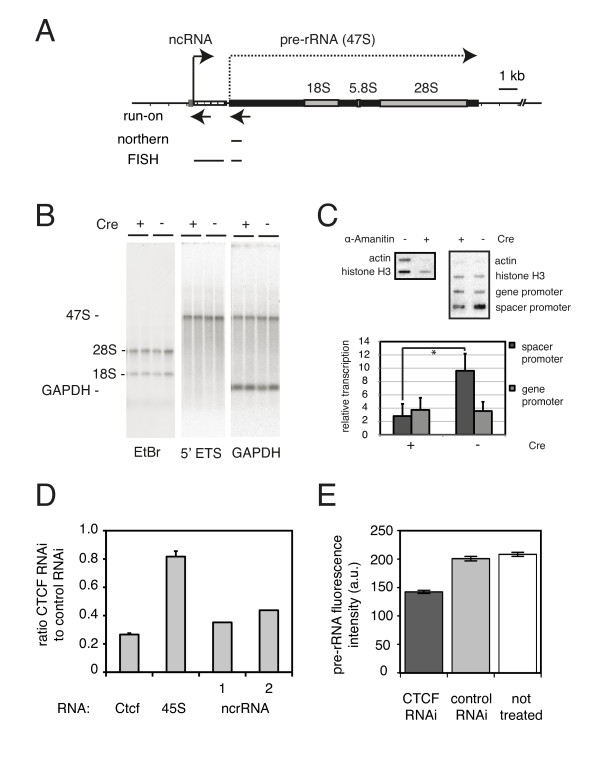Figure 7.
CCCTC binding factor (CTCF) activates spacer promoter transcription. (A) Transcribed portion of mouse ribosomal (r)DNA. Transcription initiation (spacer promoter = ncRNA, gene promoter = pre-rRNA, right-pointing arrows) and positions of run-on (left-pointing arrows), northern blot and fluorescent in situ hybridization (lines) probes are indicated. (B) Northern blot analysis. Total RNA from Ctcff/f primary mouse embryonic fibroblasts (MEFs) (either treated (+) or not (-) with Cre) was analyzed sequentially with probes against the 47S pre-rRNA [32] and Gapdh (two samples per genotype shown, > 10 independent samples per genotype analyzed. (C) Spacer promoter transcription in the absence of CTCF. Nuclear run-on of spacer and gene promoter in Ctcff/f MEFs (Cre-treated (+) or not (-)). The suppression effect of α-amanitin on RNA polymerase II-mediated transcription was measured. Left panel shows Actin and Histone H3 genes; a typical run-on is shown on the right. The graph shows the relative transcription activity of spacer and gene promoter (three independent experiments; *P = 0.005, Student t-test). (D, E) CTCF knockdown in embryonic stem (ES) cells. Cells were transfected with a pSUPER plasmid to knock down CTCF (controls were either no transfection, or transfection with a control vector). After 4 days, cells were harvested for (D) RNA analysis by PCR, or fixed and analyzed by fluorescent in situ hybridization (E). ncRNA was determined twice with independent primers (1, 2), Ctcf and pre-rRNA were determined four times (SD indicated). Taking the average of the four ncRNA experiments showed a reduction of spacer transcript in CTCF-depleted cells to 39 ± 22% (mean ± SD). (E) Quantification was performed with > 300 cells per treatment (SEM indicated).

